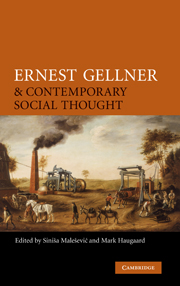Book contents
- Frontmatter
- Contents
- Notes on contributors
- Acknowledgements
- Introduction: an intellectual rebel with a cause
- Part I Civil society, coercion and liberty
- Part II Ideology, nationalism and modernity
- Part III Islam, postmodernism and Gellner's metaphysic
- 8 Islam, modernity and science
- 9 Truth, reason and the spectre of contingency
- 10 Gellner's metaphysic
- Index
- References
10 - Gellner's metaphysic
Published online by Cambridge University Press: 22 September 2009
- Frontmatter
- Contents
- Notes on contributors
- Acknowledgements
- Introduction: an intellectual rebel with a cause
- Part I Civil society, coercion and liberty
- Part II Ideology, nationalism and modernity
- Part III Islam, postmodernism and Gellner's metaphysic
- 8 Islam, modernity and science
- 9 Truth, reason and the spectre of contingency
- 10 Gellner's metaphysic
- Index
- References
Summary
Ernest Gellner was most often termed a polymath by those impressed by his achievements. This is entirely comprehensible because he had distinct reputations in several fields, notably as theorist of Islam and nationalism and as both anthropologist and philosopher. But Gellner himself was wont to bridle at this sort of description, stating that beneath these different fields lay a common set of concerns. What was on Gellner's mind at this point is straightforward: he was claiming intellectual greatness. It is easy to see what he meant. Significance in a thinker derives from the presence of an underlying metaphysic rather than from facility in different fields of endeavour. The purpose of this chapter is to identify Gellner's metaphysic and to subject it to analysis. Two immediate words of caution are in order. First, to capture every element of Gellner's core concerns in a single essay is impossible. Accordingly concentration here is more on the philosophical than on the sociological elements of his metaphysic, on the grounds that these were crucial to Gellner himself, at all times of his life, yet have been almost wholly neglected in the secondary literature. Of course, there is no easy divide between philosophy and sociology within Gellner's work, and his metaphysic has historical and sociological elements at its core. Still, concentration here is on philosophical claims rather than on his sociology of open and closed societies. Second, my own analytic stance combines elements of appreciation with suggested modifications in a slightly unstable mix.
- Type
- Chapter
- Information
- Ernest Gellner and Contemporary Social Thought , pp. 253 - 270Publisher: Cambridge University PressPrint publication year: 2007
References
- 1
- Cited by

